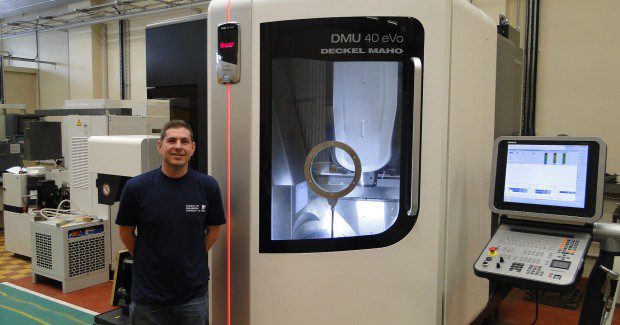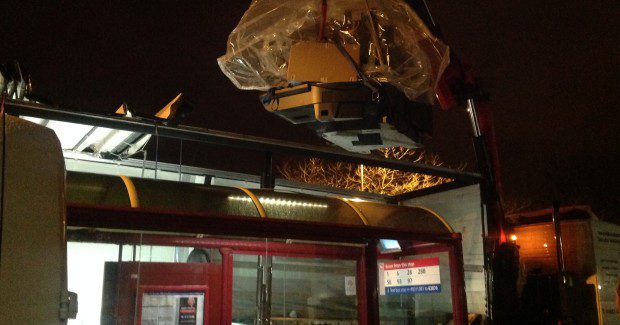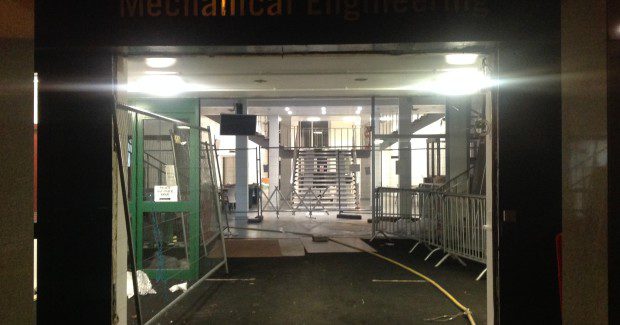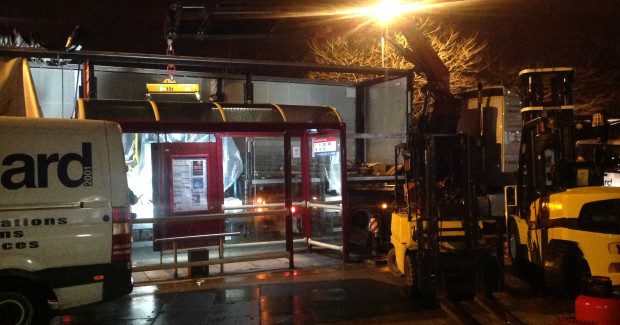DMG MORI Installation at Leeds University
The University selected a DMU 40 eVo linear for its 18,000 rpm spindle speed, 5-axis continuous machining capabilities, dynamic swivel rotary table, linear drives and small footprint..
Posted: May 31, 2014
The University of Leeds (Leeds, UK) is set to become a center of excellence for robotics thanks to major funding from the Engineering and Physical Research Council (EPSRC) to form a £4.3 million National Facility for Innovative Robotics Systems, directed by Dr. Robert Richardson.
The aim of the facility is to become a national resource for robotics and to make it possible to manufacture components for these devices which were previously very difficult or impossible to produce. Many of the applications demand miniaturisation.
Already, a robot has been built to penetrate small 20 cm by 20 cm shafts in the pyramids at Giza and has revealed hieroglyphics in a secret chamber that have not been seen for thousands of years.
Other applications include inspection of inaccessible or hazardous areas in aerospace or nuclear power station projects, quick identification of victims trapped in buildings following a natural disaster, improved surgical outcomes through the internal monitoring of a patient’s condition during an operation, and advanced prosthetic devices.
The funding provided the opportunity to install 16 pieces of high technology equipment. Facilities manager, Graham Brown says, “We wanted to select world class machinery which would make us a centre for robotics and facilitate collaboration with industrial partners which would in itself generate additional funding for further advanced projects. Up to now, many of the robotic projects have had to be theoretical, but with the new facility we will be able to turn them into reality.”
The University of Leeds selected the DMU 40 eVo linear from DMG MORI (Conventry, UK) for its 18,000 rpm spindle speed, 5-axis continuous machining capabilities, dynamic swivel rotary table, linear drives and small footprint.
Other equipment purchased at the same time included an Object 1000 3D printer which is one of the largest available and capable of printing in medically compatible materials; a Synova laser cutter which is one of only three worldwide and which will be used for cutting piezoelectric ceramics; a Citizen sliding head lathe for cutting 3 mm diameter components 200 mm long; and a LPKF laser structuring machine which will make it possible to incorporate electronics into the shell of a robot.
Once the funding had been approved, Brown was faced with a tight schedule for the completion of the installation of all the machinery as well as some major logistical problems. “The machines had to be in and commissioned by 28th of February 2014 to comply with the funding conditions. We also had a maximum headroom inside the building of 2 m and the DMU 40 eVo linear was 2.4 m high. In collaboration with DMG MORI we carried out a survey and drew up a detailed plan for the installation.”
Within the building three walls had to be demolished to allow sufficient space for the machine to pass, service ducts, which had not been opened for 35 years, had to be reinforced to take the weight of the machine, and DMG MORI stripped the machine down in Germany to reduce its height below the 2 m limit.
The difficulties were not just inside the university building as a major road into Leeds needed to be closed for the delivery. Brown and his team used a traffic management company and were allotted an eight hour time slot between 10 pm and 6 am to complete the installation. As part of the plan the Object 3D printers and the DMU 40 eVo linear were to be delivered at the same time.
On the day of the installation, the main doors to the Engineering Faculty were removed, which had its own security implications, and a temporary pedestrian walkway and bus stop were set up. When the machines arrived at 10 pm, the Object printers were moved first and the DMG MORI machine second, further limiting the time available.
The thorough planning paid off as the DMU 40 eVo linear was craned over the bus stop and dragged through the main entrance. Even details such as protecting the floor from damage had been considered. Following the installation, DMG MORI engineers were on site for two weeks to rebuild, test and commission the machine.
Brown stated, “The plan was perfect, even though the DMU 40 eVo linear was the second machine to be installed it flew in and was completed in three hours, well inside the time allowed.”
Stewart Cousins, the business development manager for DMG MORI, was the contact point for the University of Leeds and collaborated with its team in planning the installation. Cousins stated, “We were careful to ensure that we had understood the logistical requirements and had foreseen any potential pitfalls. We had a good dialogue during the whole process, which went with military precision. Communication at every stage was the key to the success of the project.”


















